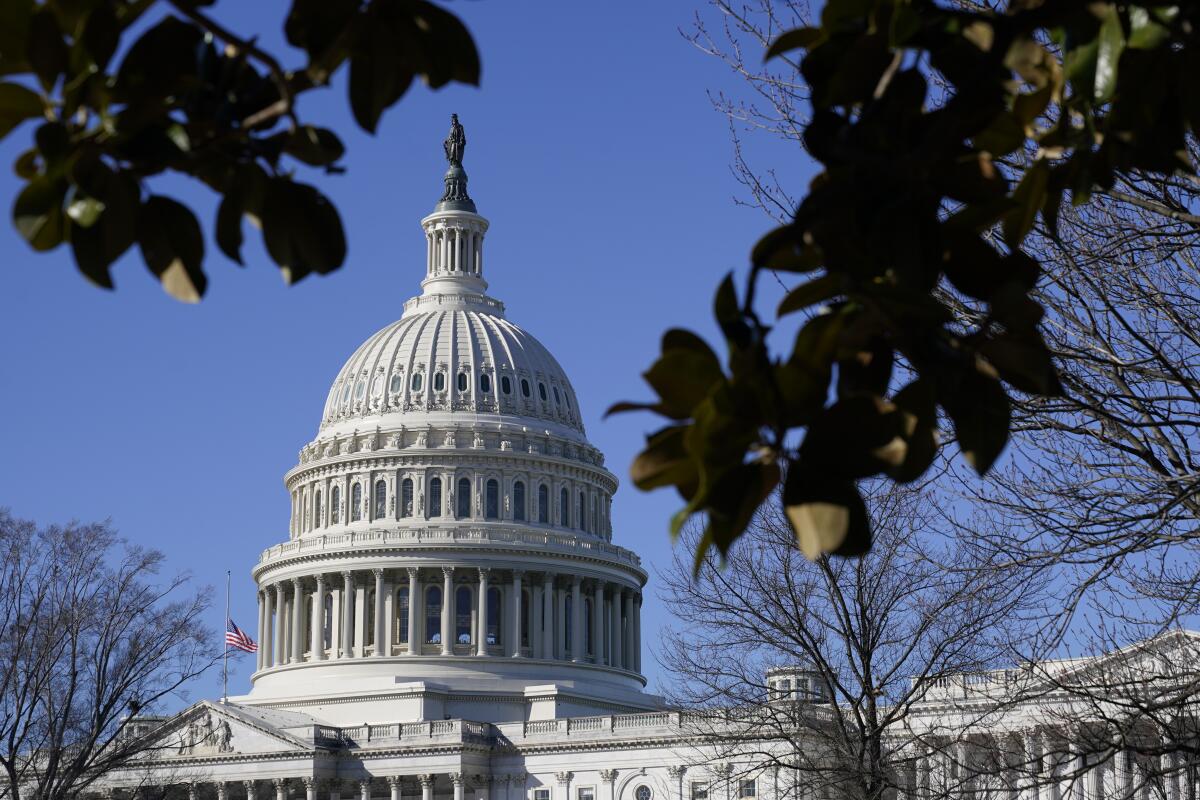Newsletter: GOP narrowly wins House control, boosting its ability to stymie President Biden’s agenda

- Share via
Good morning, and welcome to the Essential California newsletter. It is Saturday, Nov. 19.
Editor’s note: Essential California will take the holiday week off and return on Nov. 28.
Sign up for Essential California
The most important California stories and recommendations in your inbox every morning.
You may occasionally receive promotional content from the Los Angeles Times.
Here’s a look at the top stories of the last week
California flips the House. Republican Rep. Mike Garcia has won reelection to his northern Los Angeles County seat, dashing Democrats’ hopes they could reclaim the district. His win pushed Republicans to the majority in the next Congress.
Karen Bass is elected L.A. mayor. Bass has defeated businessman Rick Caruso in the mayor’s race, according to an Associated Press projection Wednesday, making her the first woman and second Black Angeleno elected to lead the city in its 241-year history.
California estimates a $25-billion deficit next year. Driven by high inflation and the threat of a recession, the state’s Legislative Analyst’s Office predicts a potential deficit next year that could at minimum curb some recent spending increases for essential safety-net programs.
48,000 UC academic workers go on strike. Unionized academic workers across the University of California’s 10 campuses — who perform much of the teaching and research — walked off the job, calling for better pay and benefits in the nation’s largest strike of the year.
California reports first RSV and flu death. Public health officials on Monday reported the season’s first death of a child under 5 due to flu and RSV. Flu season has reached levels not seen in years.
A plan to reach carbon neutrality by 2045. California air quality officials released a bold climate plan this week that reflects Gov. Gavin Newsom’s accelerated goal of curtailing planet-warming emissions by 48% this decade compared with 1990 levels. It’s the clearest picture yet as to how the world’s fourth-largest economy can meet its ambitious climate targets while maintaining economic growth and accommodating a larger population.
Free online games
Get our free daily crossword puzzle, sudoku, word search and arcade games in our game center at latimes.com/games.
Minor police encounters plummet with new LAPD rules. A policy change requires officers to record their reasoning before initiating a “pretext stop.” A Times analysis finds that officers are stopping far fewer people, but with more frequent success at discovering contraband.
The dark journey of the Pelosi attack suspect. While attention has focused on his extremist, antisemitic rantings and apparent belief in far-right conspiracy theories, interviews with those who knew David DePape present a complicated view of a man who began to “deteriorate” over the last year and a half.
Jennifer Siebel Newsom testifies against Weinstein. Jennifer Siebel Newsom, wife of Gov. Gavin Newsom, took the stand Monday at Harvey Weinstein’s sexual assault trial and accused the fallen Hollywood mogul of assaulting her when she was a struggling actor.
Prepare for crowds at Yosemite. Yosemite National Park will no longer require reservations in the summer of 2023. In their announcement this week, National Park Service officials noted the reservation system has been a temporary measure up to now, and that more research is needed before they can put a permanent system in place.
Enjoying this newsletter?
Your support helps us deliver the news that matters most. Become a Times subscriber.
ICYMI, here are this week’s great reads
The state of the karaoke union. During the worst of the pandemic, L.A.’s karaoke clubs were just as barren as its concert venues. Today, from the private-room clubs in Koreatown to the Valley and the beaches, Angelenos are back to belting “Shallow” after too many soju shots. Plus: L.A.’s best spots and how to find the perfect song for you.
The vanishing ‘Russian Hollywood’ landscape. Once numbering in the tens of thousands, the Soviet and post-Soviet émigré community has long been shrinking in Southern California, receding from view, along with its institutions and other tangible signs of its existence. It’s in the way of émigré communities to vanish, at times over and over again. But author Boris Dralyuk hopes the banquet hall and other haunts of latter-day émigrés won’t be entirely forgotten.
Telling the story of Eureka’s Chinese residents. In the late 19th century, Chinatown occupied a single block in the middle of the remote, misty port town. When the economy soured in the 1880s, white people blamed the Asian immigrant community in Eureka, claiming they stole jobs. Newspapers whipped up anti-Chinese sentiment. Some California city officials are now acknowledging the ugly past.
Banning rodeos in California? For those who admire a “western lifestyle,” a good rodeo performance highlights the skill, bravery and strength of a talented cowboy or cowgirl. But for others, the rodeo is a horror show. In California, there is a growing movement to ban — or seriously curtail — these kinds of performances.
Plant these fragrant native plants now. Our colleague and gardening fan Jeanette Marantos gathered a panel of experts to recommend what to plant, including the Cleveland sage — with aromas from sweet to sharply savory — and the California laurel, a handsome forest tree that can grow from 6 to 60 feet tall.
Today’s week-in-review newsletter was curated by Laura Blasey and Elvia Limón. Please let us know what we can do to make this newsletter more useful to you. Send comments, complaints and ideas to essentialcalifornia@latimes.com.
Our daily news podcast
If you’re a fan of this newsletter, you’ll love our daily podcast “The Times,” hosted every weekday by columnist Gustavo Arellano, along with reporters from across our newsroom. Go beyond the headlines. Download and listen on our App, subscribe on Apple Podcasts and follow on Spotify.
Sign up for Essential California
The most important California stories and recommendations in your inbox every morning.
You may occasionally receive promotional content from the Los Angeles Times.







